The first farmers of Europe found in the Balkans date to the 5th millennium BC
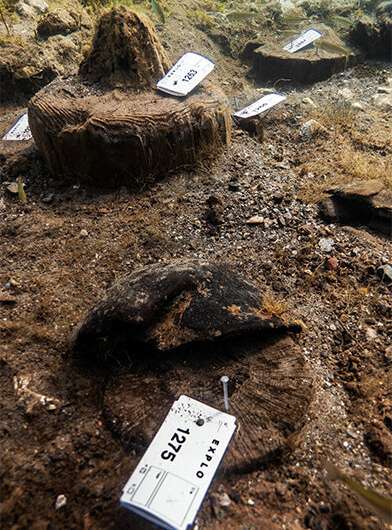
A research team from the University of Bern has managed to precisely date pile dwellings on the banks of Lake Ohrid in the south-western Balkans for the first time: they came into being in the middle of the 5th millennium BC. The region around the oldest lake in Europe played a key role in the proliferation of agriculture.
Remains of under-water sites are a stroke of luck for pre-historic archeology. The wooden piles from which their foundations were built have been preserved excellently: In the absence of oxygen, they were not corroded by bacteria or fungi. Wood preserved in this way is excellently well suited for dendrochronological examinations, which can be dated using growth rings. The age of the wood, and thus the time at which the settlements were built, can be determined in combination with radiocarbon dating. This method has now been applied outside of the Alpine region for the first time.
Under the leadership of the University of Bern, around 800 piles were dated in the large international EXPLO project (see info box). They come from a site on the east coast of Lake Ohrid. The results were presented recently in the Journal of Archaeological Science. The new findings prove that the settlement in the Bay of Ploča Mičov Grad near the Macedonian town of Ohrid was constructed in different phases. And over thousands of years: From the Neolithic Period (middle of the 5th millennium BC) until the Bronze Age (2nd millennium BC). Until now, it was assumed that it was a settlement from the period around 1,000 BC. This intensive construction activity explains the extraordinary density of wooden piles at the site. The settlements were built virtually over one another.
The cradle of European agriculture
"The precise dates of the different settlement phases of Ploča Mičov Grad represent important temporal reference points for a chronology of prehistory in the south-western Balkans," says Albert Hafner. He is Professor of Prehistoric Archeology at the University of Bern and a member of the Oeschger Center for Climate Change Research. The precise chronological classification, in turn, opened up unimagined possibilities of interpretation for the traces found of the early occupation of Lake Ohrid. A so-called cultural layer is hidden under the present-day lakebed. It consists mainly of organic material and is up to 1.7 meters thick. Among other things, it contains the remains of harvested grain, wild plants and animals, which can provide conclusions on the development of agriculture. In the Balkans, the newly arrived farmers were confronted with comparatively cool and humid climate conditions, which forced them to adapt agricultural practices accordingly. "The interactions between this revolutionary innovation and the environment are largely unknown,"emphasized Hafner. This is precisely the research gap that the EXPLO project aims to fill.
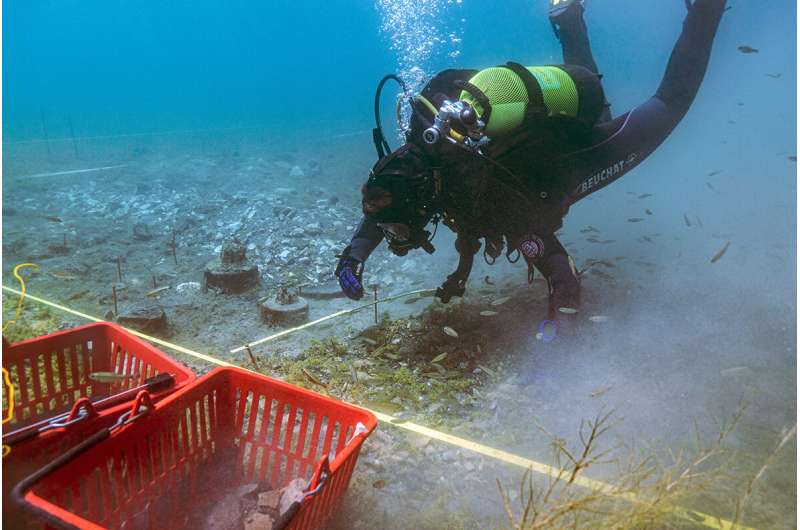
The pile dwellings in the Alpine region and the archeological site in the Balkans are the only remains of settlements from the Neolithic Period with excellent organic conservation. The early findings are particularly interesting as the area played a key role in the proliferation of agriculture: Europe's first farmers lived here. Early cattle breeders and arable farmers from Anatolia first reached the Aegean region, especially northern Greece, and then Central Europe via southern Italy and the Balkans more than 8,000 years ago.
Important cultural heritage in the Balkans
"Our investigations are shining a light on the large potential for future research on the pre-historic settlements in the region," says Hafner. The significance of the settlements on Lake Ohrid is huge: "The pile dwellings around the Alps have been considered a UNESCO World Heritage Site since 2011, and the wetland settlements in the south-western Balkans are no less significant," said Albert Hafner. The region offers a situation comparable to the area around the Alps: Relics of prehistoric settlements have been preserved in numerous lakes in modern Albania, northern Greece and North Macedonia. However, with few exceptions, the sites in the Balkan region have hardly been studied so far.
Bern researchers are also pursuing other goals over the long term. "We want to help ensure that the value of these wetland settlements is recognized locally and that these cultural assets are better protected," explained Hafner. Sites are not only located on the north Macedonian shore of Lake Ohrid, where the EXPLO team conducted fieldwork campaigns in 2018 and 2019, but also on the Albanian western shore of the lake, where the researchers were active this summer at the Lin 3 site. In the long term, it is planned to expand collaboration with local partners, support the education and training of researchers from the region and promote local initiatives.
JULY 1, 2021
'Gone to hell': The battle to save Europe's oldest lake
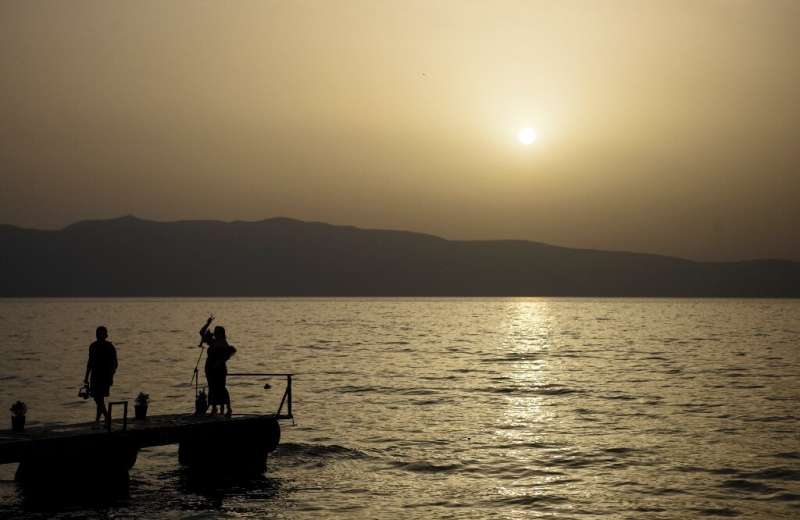
Dimitar Pendoski marches to the end of a rickety walkway, skips around sunbathing youngsters and sweeps back a tarpaulin protecting his empty lakeside restaurant, recently closed by officials under pressure from UNESCO.
North Macedonia's government is scrambling to enforce environmental protection rules and shut down places like Pendoski's self-built restaurant, to save Lake Ohrid from being placed on the UN culture agency's list of endangered world heritage sites.
"This way, everybody loses—the employees, the local economy, and of course the tourists because they have no place to go on the beach," Pendoski tells AFP, a point hotly contested by environmentalists.
Thanks to its unique animal and plant life, prehistoric ruins and Byzantine churches, Lake Ohrid and its surroundings have enjoyed four decades as a UNESCO world heritage site.
Only a few dozen places around the world have won the status for both their nature and their culture, a source of prestige for Lake Ohrid—and a major bonus in marketing the area to tourists.
But the UN body has said the Ohrid region will be put on the "in danger" list during a high-level meeting later in July because of concerns over uncontrolled urbanisation and pollution.
Unless North Macedonia can perform diplomatic miracles, the lake will be cited along with such marvels as Australia's Great Barrier Reef.
Ohrid city mayor Konstantin Georgieski is at the centre of a tangle of local and national government bodies tasked with addressing the problems.
His mission is complicated by the international dimension—part of the lake is in Albania, and their officials are also taking part in discussions with UNESCO.
But Georgieski is not panicking.
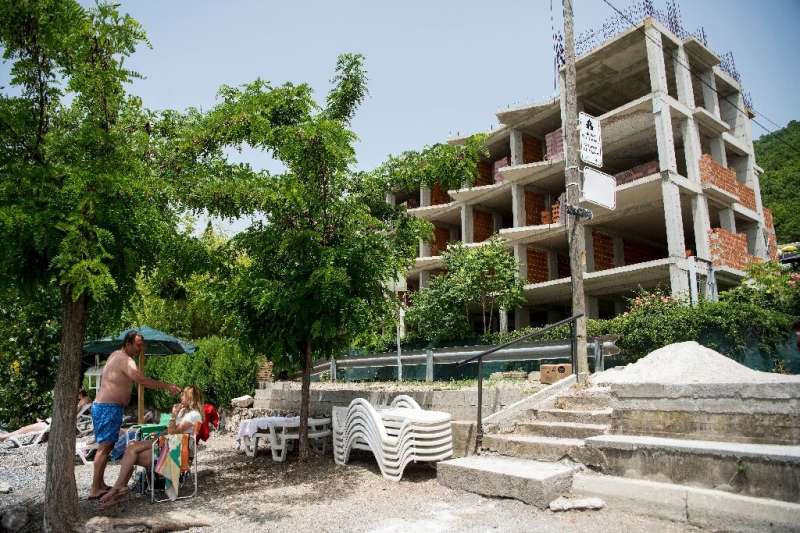
"It is not going to mean the end of the world," he says of the UNESCO's decision, pointing out that the heritage status does not bring any funding.
"After 30 years of negligence, it's normal that they (UNESCO) are losing patience."
'Cancer of the lake'
UNESCO first added the Macedonian side of the lake to its world heritage list in 1979, expanding the entry to include the Albanian side only in 2019.
During the time of Yugoslavia, Ohrid was a sleepy settlement known mostly for its hospitals and as a training post for sports teams.
After Macedonia's secession and Yugoslavia's chaotic disintegration in the 1990s, however, tourist developments began expanding along the lakeshore.
Esplanades, five-storey hotels, restaurants and bars have sprung up—and with them came apartment blocks amounting to a satellite of the old town.
Entrepreneurs exploited legal loopholes to build on protected land, often without even connecting to the sewerage system.
UNESCO estimates one third of buildings in the wider Ohrid region pump waste directly into the lake.
"Everything has gone to hell," says Nikola Paskali, an archaeologist who has spent two decades diving on the lake.
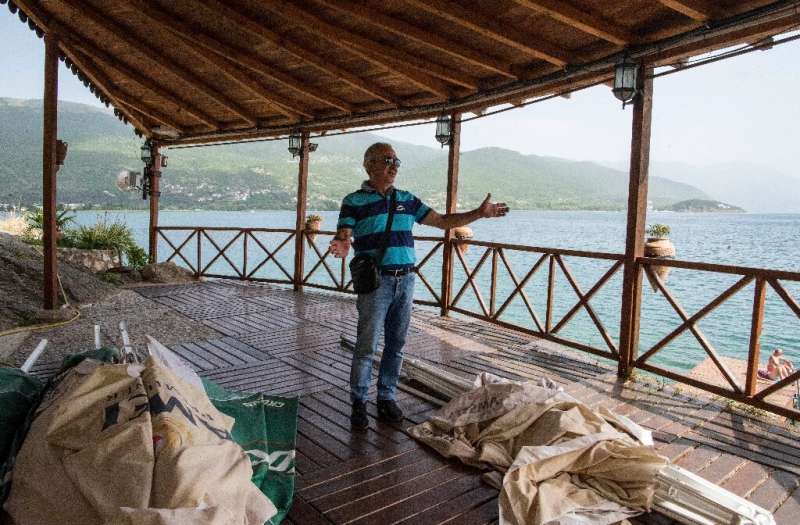
Sometimes he searches for Bronze Age relics but sometimes he hunts out junk—TVs, toilets and even a full-size bathtub are among the items he has pulled from the deep.
"Litter is the cancer of the lake," he says, accusing the government of doing little to protect biodiversity in a lake that formed more than 1.3 million years ago and is home to dozens of unique species.
UNESCO has highlighted problems from illegal buildings, logging and fish farms, to river diversions and haphazard road construction.
Much of this is underpinned by the region's desire to become a centre for tourism.
"If we started now, it would take years and years to repair the damage we have done," says Katarina Vasileska from grassroots environmental group Ohrid SOS.
'This is not Ibiza'
But cleaning up the lake comes with risks.
Mayor Georgieski recently ordered the destruction of several structures built over the lake that served as makeshift nightclubs and restaurants.
"It's difficult to destroy someone's property in a small town like ours," he says. "I'm a personal enemy of these people now."
But he reflects that business owners need to change their mindset, adding: "This is not Ibiza."

Georgieski envisages a town that welcomes sustainable levels of tourists attracted by culture and nature rather than partying.
But UNESCO said in its most recent report that restoration work had damaged the "authenticity" of some churches, and that the unique wood-beamed buildings of the old town were at risk from uncontrolled development.
Restaurateur Pendoski does not disagree with UNESCO or the mayor, but he claims he was closed down despite having received all the necessary permits.
"We all share the goal of having more guests while protecting the lake and nature, but there has to be some local economic development," he says.
Environmentalists argue, however, that pitting economic development against ecological concerns is a false debate.
"We have to keep the lake clean because otherwise we will lose everything, we will lose tourism," says diver Paskali.
Activist Vasileska also points out that receiving permits is not a green light for pollution.
"You may employ 30 people," she says, "but you pollute the lake for 50,000."
© 2021 AFP
No comments:
Post a Comment